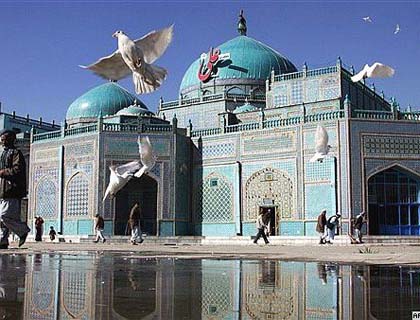Afghanistan, over the past one decade, has been dealing with an array of challenges among which stemming the tide of a roaring Taliban insurgency has been only one. If on one hand, dealing with the threat of a re-Talibanization of Afghanistan has been difficult enough, on the other, bringing rapid development in the areas of economy as well as politics have been other challenges.
In the area of political development Afghanistan's track record has been a mixed bag of failure and achievements. Perhaps, Afghanistan's most prominent achievement has been instituting a democratic political system that has a fairly strong chance of being viable and durable if the state in Afghanistan can deal wisely and effectively with the multitude of challenges ahead.
In the yesteryears and when Afghanistan was going through its early experience with democracy, those years, later, came to be known as "the decade of democracy". Under King Zahir and when a new Constitution was adopted and the country experienced a more liberal political atmosphere with a flourishing parliament and a representation system, the "decade of democracy" was made a fairly good impression upon the people in general.
People today think fondly of those years and tend to compare the democracy of today to that era. In people's perception, the political system of that era was significantly more humane, much less corrupt and closer to people and their daily existence.
The impression of people, today, of the kind of political and administrative system they see in existence is fraught with a sense of alienation and anger mixed with palpable frustration. What is surprising is that even in the more calm areas in the north and where people have tended to be supportive of the current political dispensation, sentiments and feelings have been becoming markedly less sympathetic to the government and the administrative system. There are indeed surprising facts to know.
Is Afghanistan reaching a point where the whole system is blinking red or is it already past that threshold? The answer does not come easy. A look at those provinces in the north such as Balkh, where calm and political stability of recent years have had a positive impact on the lives of common people, lead us to get close to one part of the answer.
In Balkh province and over the past few years, there has been a marked improvement in the lives of people. Perhaps, the fact that it is a border province and is a major focal point for regional trade and commerce can partly explain this improvement.
The other if not more significant, equally significant reasons are the relative political stability, and, yet more important, the fact that the affairs in Balkh province have been managed by a provincial government and provincial governor (Ustad Atta Noor) who have kept themselves shielded from the central authority in Kabul. Political relations between the center and Balkh provincial government and its governor, as it is well known, have been extremely rocky.
This provincial governor's insistence on resisting micro-management from the center and taking initiatives of his own, surprisingly enough, has led to better overall performance of the government and has been a significant facilitating factor for the growth of trade, commerce and investment in large parts of the province.
The case of Balkh province has important implications for Afghanistan of today. Does this case not warrant a more thorough and serious look into the possibility of replicating such a model in more parts of Afghanistan? – albeit with the difference that the kind of hostile center-provincial relations in the case of Balkh should be crafted into a relationship based more on mutual cooperation and legally-defined frameworks of jurisdictions and authorities between the two entities.
The bitter fact is that the kind of clumsy micro-management-cum-macro-management currently being rendered by the central government in Kabul is complicating the situation across the country while stifling creativity and innovation. The time, more than being ripe, has already turned critical and with every passing month, quarter and year, the load of odds against the success of such a model becomes heavier.
The need is to think out of the box, and do away with the current paradigm towards one that would be more in tune with at least the lessons learned over the past one decade. Among these lessons, the lesson of Balkh province certainly stands as a prominent one.
The more the government of Afghanistan (and of course the international community) resist change and instead choose to press ahead with the current failed model, the opportunity costs of inaction and lost opportunities continue to mount and pile up.
Statistically and economically speaking, these opportunity costs (because of inaction and lack of bold reforms) can be translated into hundreds of billions of dollars in foreign military spending on trying to keep the Taliban at bay and prop up a system that otherwise would falter.
This contrast is appalling while, at the same time, provides us with a snapshot of some of more fundamental problems with how things in Afghanistan are being handled. While the international community led by the U.S. is sacrificing tremendously in both blood and treasure in Afghanistan, these very efforts are being undercut by an Afghan political and bureaucratic paradigm that is vastly contributing to rendering these efforts ineffective.
The international community, including the U.S., indeed needs to hold this system and its administrators to account. If the need be, reforms and change should be pushed down the throat of this system and its vanguards. Of course, there are countless many vested interests which are opposed to seeing reforms and change. The first challenge would be to cross this strong wall of resistance – both political as well as bureaucratic-organizational.

